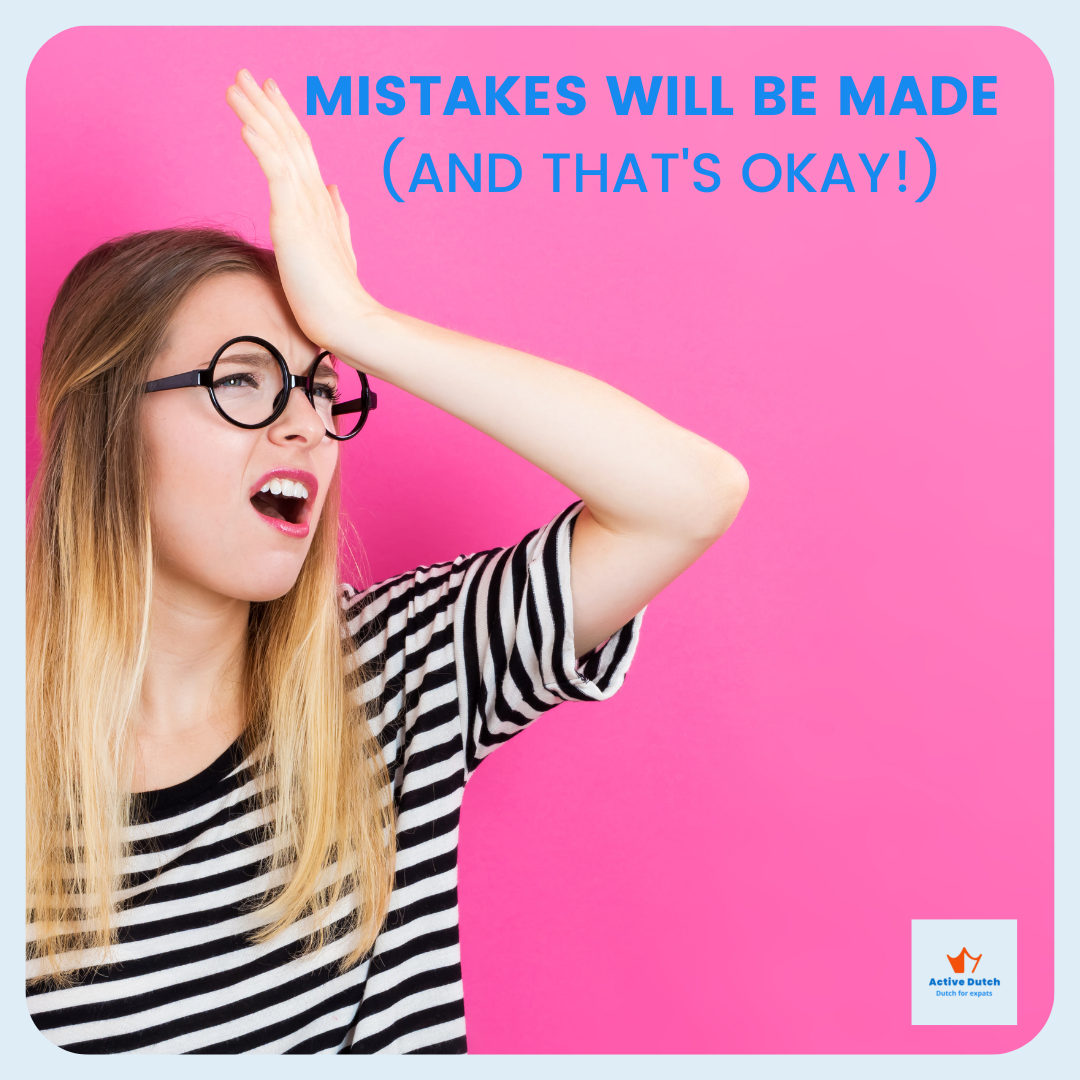In Dutch “jij”, “je”, “jou” and “u” all mean “you” in English. And the word “zijn” can mean “are” or “his” depending on the sentence. This is all super confusing for beginners! Over the years I have heard students making a lot of similar mistakes, so I have compiled an overview of the most common mistakes beginner Dutch speakers make, and then provided the corrections. Once you know why something is wrong, it’s easy to avoid these mistakes the next time! (These mistakes are listed in random order.)

Top 15 common mistakes in Dutch
1. “Hoe gaat het met je?” Answer: “Ik ben goed. ” Correct: “Met mij gaat het goed.” / or just “Goed”.
“Ik ben goed” is a literal translation from English “I’m good.” In Dutch “Ik ben goed” means you are good at something. For example: “Ik ben goed in talen.” (I’m good at languages.)
2. “Ik ook woon in Leiden.” Correct: Ik woon ook in Leiden. (I also live in Leiden.)
In a Dutch main clause you cannot put any words in between the subject and the finite verb.
3. “Ik vind Nederlands is moeilijk.” Correct: “Ik vind Nederlands moeilijk.” (I find Dutch difficult.)
The construction is: “Ik vind <noun> <adjective>”.
4. “Ik hou van golf. En je?” Correct: “En jij?” (I like golf. And you?)
In a sentence without a verb, you must use the strong form “jij”.
5. “Mijn familie wonen in Amerika.” Correct: “Mijn familie woont in Amerika.” (My family lives in America.)
The word “familie” is singular in Dutch, so we say the Dutch equivalent of “lives” (“woont”), not “live” (“wonen”).
6. “Het is vandaag leuk weer.” Correct: “Het is vandaag lekker weer.” (It’s nice weather today.)
We use the word “lekker” to talk about the weather.
7. “Ik ga naar thuis.” Correct: “Ik ga naar huis.” (I’m going home.)
“Thuis” means “at home” in English. In Dutch, “thuis” is the equivalent of “in huis”.
8. “Ik woon voor drie jaar in Nederland.” Correct: “Ik woon drie jaar in Nederland.” (I have lived in the Netherlands for three years.)
“Voor drie jaar” is a literal translation from English. In Dutch, we don’t use the preposition “for” to indicate how long you have lived somewhere.
9. “Ik leer Nederland.” Correct: “Ik leer Nederlands.” (I’m learning Dutch.)
Nederland = the country. Nederlands= Dutch (the language). This is one of the very common mistakes beginner Dutch speakers make!
10. “Ik begrijp.” Correct: “Ik begrijp het.” ( I understand.)
The Dutch verb “begrijpen” needs an object, whereas in English you can just say “I understand” without the word “it”. This is why you need the word “het” in this sentence. The same goes for “weten” ; you know something. Example:” Ik weet het. “(I know).
11. “Ik denk zo.” Correct: “Ik denk het.”/ “Ik denk van wel.” (I think so.)
The English word “so” cannot be translated as “zo” in this context. The Dutch word “zo” may look very simple, but it can be used in many ways. The most commonly used phrase with “zo”’ is “Goed zo”!”, which means “well done”.
12. “Ik heb geen tijd voor boodschappen doen.” Correct: “Ik heb geen tijd om boodschappen te doen.” (I have no time to do the grocery shopping.)
The construction [“om te” + infinitive] is used to give extra information about a noun or adjective. In this sentence “om te” gives more information about the word “tijd”. “Voor boodschappen” is just a literal translation from the English (“I have no time for ….”).
13. “Het regent, so ik blijf thuis.” Correct: “Het regent, dus ik blijf thuis.” (It’s raining, so I will stay at home.)
English “so” is equal to the Dutch “dus”.
14. The English “we” is pronounced the same as the Dutch “wie”, but “wie” actually means “who”.
The “e” in the Dutch word “we” (which means the same in English) is pronounced as the “e” in ‘de”.
15. “Deze computer kost zeventienhonderd (1700) euros.” Correct: “Deze computer kost zeventien honderd euro.” (This computer costs seventeen hundred euros.)
In English we can say “euro” or “euros” depending on the number before it, but in Dutch, we just say “euro”. It’s one of the smaller mistakes beginner Dutch speakers make, so it’s easy to fix and sound more fluent! We do say “euro’s” when speaking about the currency: “Kun je een tientje wisselen in euro’s?” (“Can you exchange a tenner in euros?”)
 You can learn more about my Dutch course options here, or contact me for more information. I would also encourage you to sign up to receive my newsletter in which I share updates and exclusive Dutch learning content for expats! If you want to get to know me and my teaching style first, you are welcome to check out student testimonials or join one of my free trial classes… I hope to see you there!
You can learn more about my Dutch course options here, or contact me for more information. I would also encourage you to sign up to receive my newsletter in which I share updates and exclusive Dutch learning content for expats! If you want to get to know me and my teaching style first, you are welcome to check out student testimonials or join one of my free trial classes… I hope to see you there!

0 Comments
Trackbacks/Pingbacks